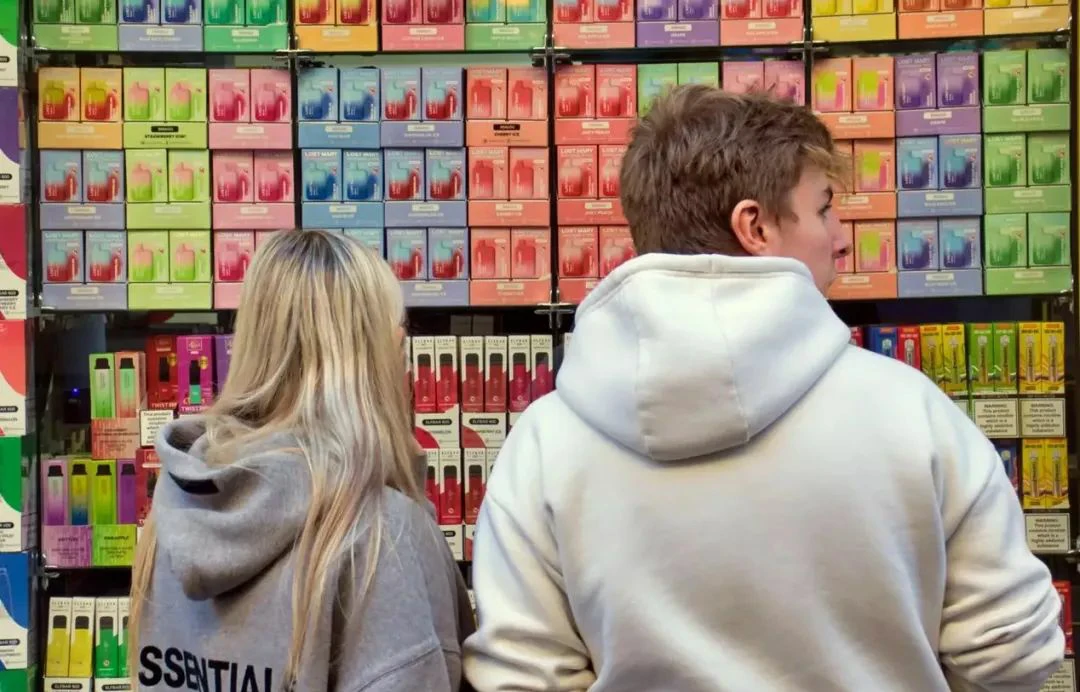Although British law clearly stipulates that teenagers under the age of 18 are not allowed to purchase vapes, the proportion of young people using vapes remains high. The latest research from Action on Smoking and Health (Ash) shows that up to 20.5% of children have tried vaping in 2023, a significant increase from 15.8% in 2022 and 13.9% in 2020. One of the main reasons why young people are obsessed with vapes is their variety of sweet flavors.

What threats do disposable vapes pose to the environment?
Nearly 5 million disposable vapes are thrown away in the UK every week, a fourfold increase from 2022, according to new research from non-governmental organizations Material Focus and YouGov.
That means eight vapes are thrown away every second, containing enough lithium to make 5,000 electric car batteries. Most of these disposable vapes contain lithium-ion batteries, which are often thrown into landfills.
Greenpeace research found that enough disposable vapes are thrown away each year to fill 22 football pitches.
What are the penalties for selling disposable vapes?
It is illegal to sell vapes, including nicotine-containing vape liquids, to anyone under the age of 18. Offenders face fines of up to £2,500. If disposable vapes are banned, this law could be expanded to include the sale of vapes.
A recent YouGov poll showed that 77% of people support a ban on disposable vapes in the UK.
How does the ban work?
The Local Government Association is pushing for a ban to be introduced through the Environment Protection Act 1990, which gives the government the power to ban the sale of “harmful substances” that are harmful to the environment or harmful to human health.
The exercise of this power could lead to a ban on single-use vapes, similar to previous bans on plastic straws and other single-use items.

Debate over banning disposable vapes
“Disposable vapes are becoming one of the most environmentally threatening, damaging, and dangerous consumer products in history.”
“The biggest challenge is how to encourage consumers to recycle vapes and provide waste disposal facilities in public places to increase recycling rates.”
“Banning is an effective tool. History shows it can work. Banning single-use vapes is not about eliminating demand, it is about moving it from the regulated market to the black market, causing unpredictable public health consequences.”
“Industry estimates suggest that more than 50% of disposable vapes are already in circulation illegally, so a ban on regulated markets is moot.”
“Banning single-use vapes goes against the UK’s successful harm reduction policies.”
“While the harms of traditional cigarettes are well known, banning alternatives that are 95% less harmful is logically unsound.”
Recently, British pharmacy chain Superdrug announced that it would stop selling disposable vapes at all stores in the UK and Ireland.
Superdrug said it has stopped purchasing all disposable vapes and plans to completely clear its stock by the end of 2023. The retailer revealed it sells 1,300 disposable vapes every week, meaning the decision could have an impact on its revenue. At the same time, supermarket chain Waitrose also announced that it will stop selling disposable vapes in January next year.
There are reports that Ireland may soon impose a total ban on disposable vapes. Health Minister Stephen Donnelly, who recently said he planned to ban all single-use vapes and would target flavors and point-of-sale regulation, is planning a second piece of legislation to curb the circulation of vapes, and restrict flavors and advertising in stores.
This time the British ban does not mean that the British vape market will weaken, but is a process of upgrading and change. Various brand manufacturers will continue to develop alternative vape products that meet British standards.
The EU is also facing a massive redistribution of British vapes. As the British vape market matures and competition becomes fierce, some British traders are selling low-priced vapes to other countries.
As of August, China’s vape exports to the UK reached US$103 million (approximately RMB 752 million), a month-on-month decrease of 23.37% and a year-on-year decrease of 5.80%.


















0 Comments